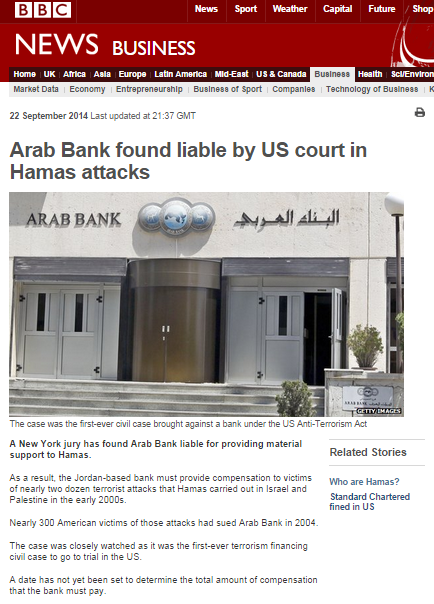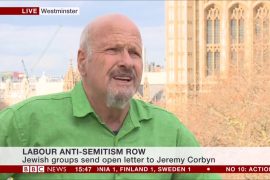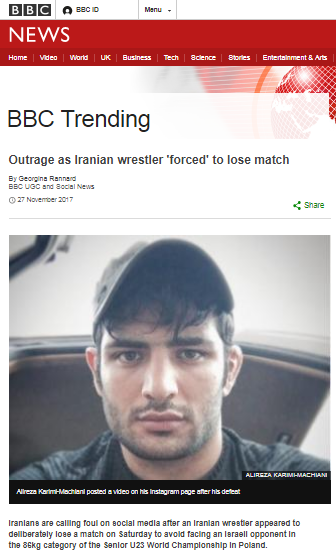On September 22nd a report titled “Arab Bank found liable by US court in Hamas attacks” was published on both the BBC News website’s Business page and its Middle East page.
Here is what the BBC’s ‘Style Guide’ has to say about the use of the word Palestine in BBC reporting:
“There is no independent state of Palestine today, although the stated goal of the peace process is to establish a state of Palestine alongside a state of Israel.
In November 2012 the PLO secured a vote at the UN General Assembly, upgrading its previous status as an “entity” so that the UN now recognises the territories as “non-member observer state”.
The change allows the Palestinians to participate in UN General Assembly debates. It also improves the Palestinians’ chances of joining UN agencies.
But the UN vote has not created a state of Palestine (rather, it failed in its bid to join the UN as a full member state in 2011 because of a lack of support in the Security Council).
So, in day-to-day coverage of the Middle East you should not affix the name ‘Palestine’ to Gaza or the West Bank – rather, it is still an aspiration or an historical entity.
But clearly BBC journalists should reflect the changed circumstances when reporting on the UN itself and at the Olympics, where the International Olympics Committee recognises Palestine as a competing nation.
Best practice is to use the term Palestine firmly and only in the context of the organisation in which it is applicable, just as the BBC did at the Olympics – for example: “At the UN, representatives of Palestine, which has non-member observer status…” ” [emphasis added]
That point does not seem to be clear to the writer of this article who – although he or she did make refreshing and accurate use of the term terrorist – also misleadingly declared locations which have yet to have their status determined in negotiations to be ‘Palestine’ and led readers to believe that such a state existed as long ago as “the early 2000s”.
“A New York jury has found Arab Bank liable for providing material support to Hamas.
As a result, the Jordan-based bank must provide compensation to victims of nearly two dozen terrorist attacks that Hamas carried out in Israel and Palestine in the early 2000s.” [emphasis added]
Another notable point about this report is that it (or any other currently appearing on the BBC News website) does not inform readers that the same court in the United States ruled on the same day that a similar case is to be reinstated. As Reuters and the WSJ reported:
“The Second U.S. Circuit Court of Appeals ruled Monday that a federal district judge got it wrong when she threw out legal claims by about 200 U.S. victims of Hamas attacks who claimed that National Westminster Bank PLC provided banking services to a London-based charity with alleged ties to the group.
The lawsuit, which the Second Circuit sent back to federal trial court in Brooklyn, was filed under the Antiterrorism Act, a 1990 law that gives victims of international terrorism recourse in U.S. courts. […]
In the lawsuit, NatWest, part of the Royal Bank of Scotland Group, is accused of maintaining bank accounts and transferring funds for the Palestine Relief & Development Fund, also known as Interpal, which the plaintiffs allege solicited funds for and otherwise supported Hamas.”
Although eight years have passed since the BBC’s ‘Panorama’ documentary on Interpal, many of the issues it raised are still very relevant to the topic of this revived court case. If that did not spark the BBC’s curiosity, one might at least have expected that the British public’s interests in the RBS group would have prompted the corporation to cover this development.




